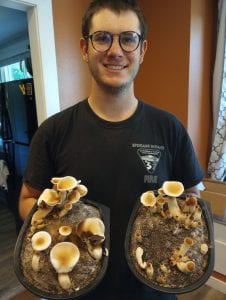Hello! My name is Connor Tobin. I am a member of the class of 2022 and am majoring in biology and history. This summer I am interning at Fungaia, a Walla Walla based company that specializes in producing high quality liquid spore culture, educational mushroom growing kits, and high-quality lab equipment for the at home mycologist! Fungaia is a DIY business, and all the facilities, including the professional sterile lab, were built by Fungaia’s founder.
A sterile working environment is a necessity when working with fungi, as contamination is always a concern. An essential tool for ensuring sterility is the laminar flow hood. Flow hoods create a sterile environment by pulling air through a high-quality HEPA filter, and then blowing it out over the working surface. These sterile conditions are needed when plating mycelium on agar plates, pulling syringes of liquid spore culture, and running any sort of experiment involving fungi. High-quality lab equipment is prohibitively expensive, and often is the major barrier of entry that prevents ordinary people from performing science. This leaves most of our scientific exploration to the hands of those working within the walls of academic and research institutions or massive pharmaceutical, biotech, and medical companies; in other words, in institutions in which the motivation for research is determined more so by the conditions of a grant or the likelihood of profit then by scientific exploration and true curiosity.
Fungaia has designed a professional grade laminar flow hood that can be made in Fungaia’s humble workshop, at a fraction of the cost that one would normally cost. I aided in the building of a new flow hood for Fungaia’s lab. The HEPA filter sits within a wooden cabinet and sits atop a metal cage which also holds the fan unit. To construct the frame, I learned to cut and finish metal with an angle grinder so that it can be welded.
Fungaia also produces portable, briefcase sized flow hoods so that mycologists can work directly with a wild specimen well still in the fungi’s natural habitat. I hope to get the chance to make one of these units from start to finish. Everything from creating the cabinet and housing to the electrical work. Working with Fungaia has opened my eyes to the fact that it possible for me to make the tools necessary to perform science myself. It is liberating to know that I don’t necessarily need to be tied to an institution to seek answers to questions I have about the natural world. I hope to apply what I have learned from my time in the Whitman biology department by exploring the scientific side of modern approaches to micro scale farming and food production. My experience with Fungaia has made it seem like it is possible to make my own equipment and ask my own questions.
Experiences like Connor’s are made possible by the Whitman Internship Grant, which provides funding for students to participate in unpaid internships at nonprofit, some for-profit, and government organizations. We are happy to be sharing blog posts from students who were supported by either a summer, fall, spring, or year-long grants at organizations, businesses, and research labs all around the world. To learn how you could secure a Whitman Internship Grant or host a Whitman intern at your organization, contact us at ccec_info@whitman.edu.

